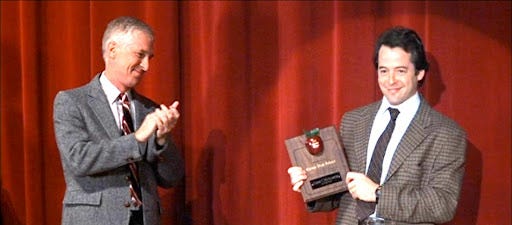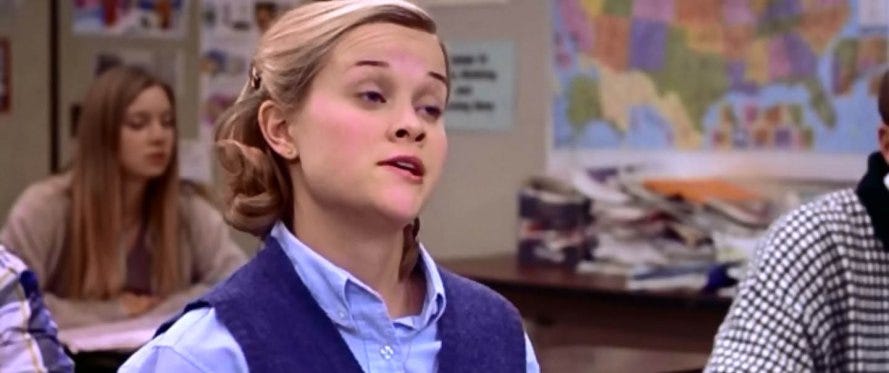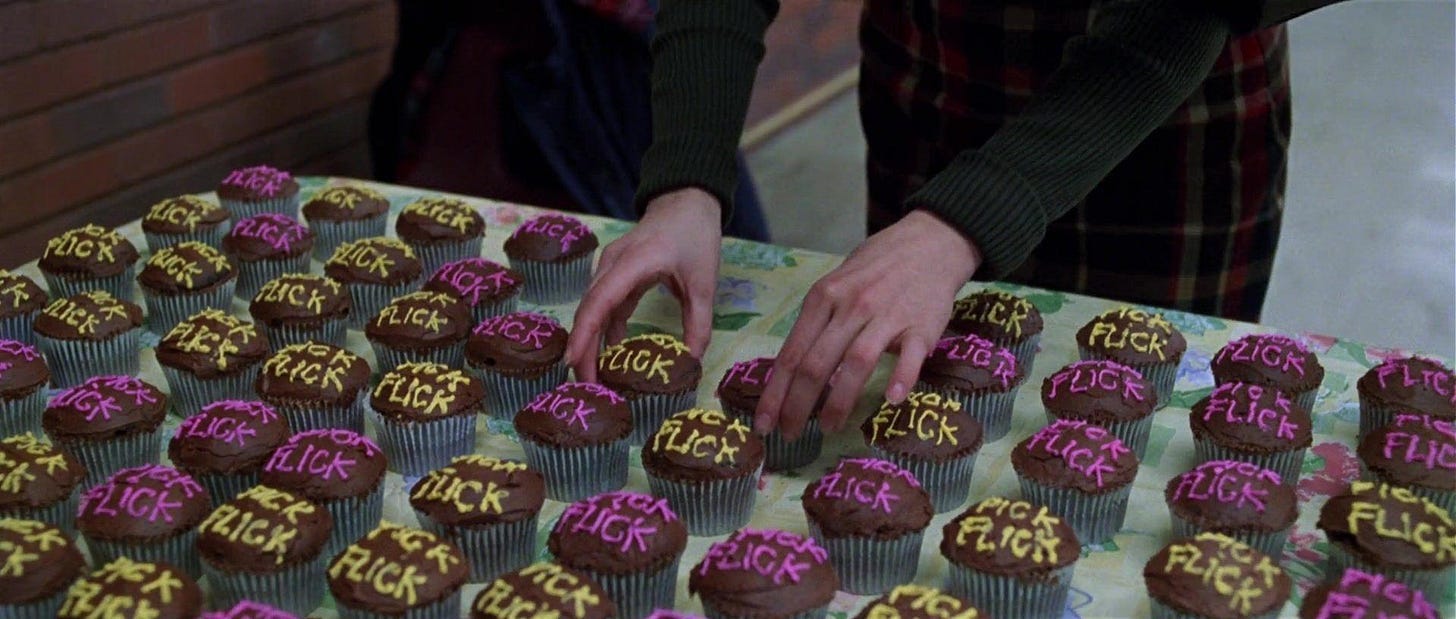The Class of 1999: 'Election'
Alexander Payne's satire is so prescient that you have to wonder if he had a time machine.
1999 was a historically-great year for film and dramatic narrative as a whole. I’m using my 2024 to look back at, reconsider, and celebrate these stories as they all celebrate their 25th anniversaries. I recently re-reviewed Go; next up on the docket is The Virgin Suicides. But first… it’s time for…
Election - directed by Alexander Payne - written by Alexander Payne & Jim Taylor - April 23, 1999
A passionate, qualified woman runs for office. Due to a lethal mixture of misogyny and the fact that she is genuinely unlikable, she finds herself challenged by an idiot who has no idea what he’s talking about and an angry insurrectionist who just wants to watch the world burn. Outside interference attempts to sway the results to its liking. There’s a recount. And in the end, almost nothing has actually changed, and history seems forever doomed to repeat itself.
I could be describing almost everything the United States has been through in the past eight years… but what I’m actually describing are elements of Election, which is one of those movies that is so prescient that you wonder if the filmmakers had a time machine. Adapted from a 1992 novel by Tom Perrotta, Election seemed timely less than two years later, when the country went through the Bush/Gore debacle; it seemed relevant in 2016, after Hillary Clinton lost to Trump1; in 2024, it feels positively clairvoyant. Director/co-writer Alexander Payne has gone on to make a lot of movies that made a dent in the culture immediately upon their release (including About Schmidt, Sideways, and last year’s The Holdovers), but none of them are as good as Election. It is one of the great dark satires of its era.
The election of the film’s title could not be less consequential: it’s a race for student body president at a public high school in Omaha, Nebraska (as one character puts it, “We’re not electing the fucking pope here”). This is likely another reason why the movie’s stature has grown in the quarter-century since its release: it’s by no means subtle, but it’s also a lot on-the-nose than other political comedies from the late ‘90s. You cannot watch Primary Colors or Dick and forget that they were partially inspired by real events; it’s hard not to come out of Bulworth or Wag the Dog and feel like you’ve just sat through (an admittedly droll) lecture. But Election is, technically, a high school movie. You can watch it while ignoring the real-world corollaries2, or you can watch it as scathingly accurate condemnation of modern American politics3, and it’s funny either way.
Election’s dual protagonists are Tracy Flick (Reese Witherspoon), a high school junior dead set on winning the college-application-worthy position, and Jim McCallister, her school’s civics teacher (one of the film’s best running jokes is that Jim repeatedly asks his students to differentiate ethics and morals, and no one, including his fellow teachers, can do so). Flick, a self-described “overachiever,” is a goody-goody with big ambitions but no real friends, because, frankly, she has a redwood-sized stick up her ass. As the movie begins, she has recently ended an affair with a math teacher, Dave Novotny (Mark Harelik), a man-child who also happens to be Jim’s best friend.
Jim, one of the school’s most popular educators (his students call him “Mr. M.”), hates Tracy, because she’s a wet blanket, because he blames her for ruining his friend’s life, and because he can only just-barely admit to himself that he wishes he had been the one to sleep with her instead. He is outwardly more of an adult than Dave, but not really.
In fact, Jim’s dislike of Tracy is so strong that when she enters the election unopposed, he persuades the school’s most beloved jock, Paul (Chris Klein), to run against her; and Paul, having recently broken his leg and therefore unable to play football this season, agrees.
But Paul doesn’t know that his new girlfriend, Lisa (Frankie Ingrassia), was recently involved with his closeted sister, Tammy (Jessica Campbell) - so when Tammy announces that she, too, is entering the race for student body president, he’s completely perplexed as to her motivation.
Initially, it seems as though Tammy has no chance of winning, both because she’s just a sophomore and because she’s even less popular than Tracy. But she unexpectedly takes the lead in the race by delivering an assembly speech in which she appeals to her adolescent peers’ most selfish and insubordinate instincts.
Now in very real danger of losing the race to one of the Metzlers, Tracy, in a fit of rage, storms the school’s hall after hours and destroys all of Paul’s campaign posters.
This becomes something of a scandal, but fortunately for Tracy, Tammy takes the blame for the desecration, because what Tammy really wants is to be expelled and sent to the local all-girls Catholic school.
Tracy suddenly being competitive again enrages Jim, whose upset is exacerbated by the fact that his personal life is falling apart: after years of failing to conceive with his spouse, Diane (Molly Hagan), he tries to initiate an affair with Dave Novotny’s ex-wife, Linda (Delaney Driscoll)… but Linda comes clean to Diane, thereby condemning Jim to sleep in his car while he awaits divorce papers. Now at his wit’s end, Jim decides to fix the election in Paul’s favor - and is caught red-handed again.
Tracy wins the election, Tammy goes to Catholic school and finds a new love interest, Paul pretty much goes on being Paul (although he does get dumped by Lisa), and Jim, now jobless and single, moves to Manhattan, where he finds a job as a tour guide at the Museum of Natural History.
Jim crosses paths with Tracy one last time, after she’s graduated from Georgetown and entered the world of professional politics (and, the film gently implies, continues to sleep with older men); in a fit of anger, he throws his drink at her limo, and then flees like a coward when her driver exits the car to confront him.
In the final scene, Jim is teaching at the museum when he encounters a young, female teacher’s pet/know-it-all. He ends the movie in the presence of yet another Tracy Flick.
A lack of self-awareness is the connective tissue between all the characters in Election. Tammy doesn’t believe herself to be a lesbian (“I’m attracted to the person,” she says in voice-over narration, “it’s just that every person I’ve ever been attracted to happens to be a girl.”), and Paul is just a total airhead (he’s also the nicest character in the story).
Jim, meanwhile, obviously hasn’t internalized his own teachings about the importance of ethics and morals. He believes he’s in love with Linda, which she correctly asserts is not true. He’s also in denial about his actual feelings towards Tracy: when he tries to rig the election against her, he convinces himself he’s doing it for the greater good, telling us in voice-over, “Who knew how high she would climb in life? How many people would suffer because of her? I had to stop her.” Lack of self-awareness is also his ultimate undoing: he’s caught rigging the election because a custodian, angry at him for failing to notice that he spilled food on the floor of the teachers’ lounge, rifles through his garbage and finds a pair of discarded ballots.
As for Tracy herself, well… she’s not exactly in touch with her anger or desire for sincere human connection, now, is she?
Appropriately, then, the movie uses apples - a traditional gift for teachers and the biblical symbol of innocence lost and knowledge gained - much the same way The Godfather uses oranges: if you seem ‘em, bad shit is about to go down. Jim begins the movie winning multiple Teacher of the Year awards, the statue for which is an apple; he uses apples as a metaphor when convincing Paul to run for office; he’s then standing near an apple tree when he suffers a catastrophic bee sting; and when he learns that Linda has told Diane about his advances, he’s drinking a beer from a refrigerator with an apple magnet on it, and enters the room where he finds Diane and Linda talking by passing beneath an archway above which decorative apples hang.
The characters’ inability to take an honest look in the mirror seems to condemn them to remain forever static: the Tracy Flicks of the world will always aggravate Jim, Tracy will likely be forever successful but also forever lonely, Tammy’s new relationship is identical to the one she shared with Lisa and will probably be just as brief, and Paul will forever be an affable idiot. It is, again, a microcosm of our current reality, where everyone is upset about the impending Biden/Trump rematch but seemingly unwilling to do anything about it or even analyze how the hell we wound up here.
This is why the film’s original ending, though taken directly from Perrotta’s novel, would never have worked tonally or thematically: it would have found Jim and Tracy making amends and moving onto happier lives, which, given the previous 100 minutes, would have seemed just as jarring as if Jurassic Park had ended with the velociraptors converting to veganism. It feels like it came from a completely different movie.
Election did not do well at the box office when it was released, grossing a little over $17 million on a budget that was either $8 million (before marketing costs - so really $16 million, at least) or $25 million, depending on who you ask. I think this is, at least in part, because it was produced by MTV Films, and thus sold as a wacky mainstream comedy. Check out the original theatrical trailer: it’s not the most misleading piece of marketing ever, but it’s certainly not an accurate representation of the film, either.
In defense of Paramount, MTV, and whoever was in charge of Election’s ad campaign, selling the movie for what it really is would probably have been a total nightmare. Because it is a broad comedy with its share of sophomoric jokes, such as its frequent, unflattering freeze frames…
…its repeated use of the score from Navajo Joe to convey Tracy’s rage…
…and the way that some of Tracy’s “Pick Flick” cupcakes have over-extended Ls, thus appearing to alter the slogan to “Pick Fuck.”
But Election is by no means mainstream; it’s one of the most nihilistic studio films ever made, a sadistic story populated by characters who are morons at best and assholes at worst. Maybe someone at the top of the Paramount/MTV executive food chain thought they had another Rushmore on their hands, or that Witherspoon’s ever-growing popularity with the youth market would put butts in seats (the considerably more palatable Cruel Intentions opened less than two months before Election, and was a big hit). But Rushmore is ultimately a reassuring, feel-good movie with a lot of heart; Election thinks people are shit and 100% deserving of the misery to which they’re often damned. Tom Cruise could have played Broderick’s role, and the movie still would have tanked.
Fortunately, time, and not box office receipts, ultimately determine how a film will be remembered… and Election has become so well-respected that in 2022, Perrotta wrote a sequel, Tracy Flick Can’t Win, which is currently being developed as a movie for Paramount+, with both Witherspoon and Payne set to return. I haven’t read the book, but the idea of catching up with Tracy decades later feels both enticing and like a huge mistake. Payne got it right the first time: those who don't know history are destined to repeat it.
The Class of 1999
Hillary Clinton apparently told Reese Witherspoon that “Everybody talks to me about Tracy Flick.”
…even though Perrotta was apparently inspired by both the Clinton/Bush/Perot race and Budd Schulberg’s What Makes Sammy Run?.
Barack Obama reportedly loves this movie.








